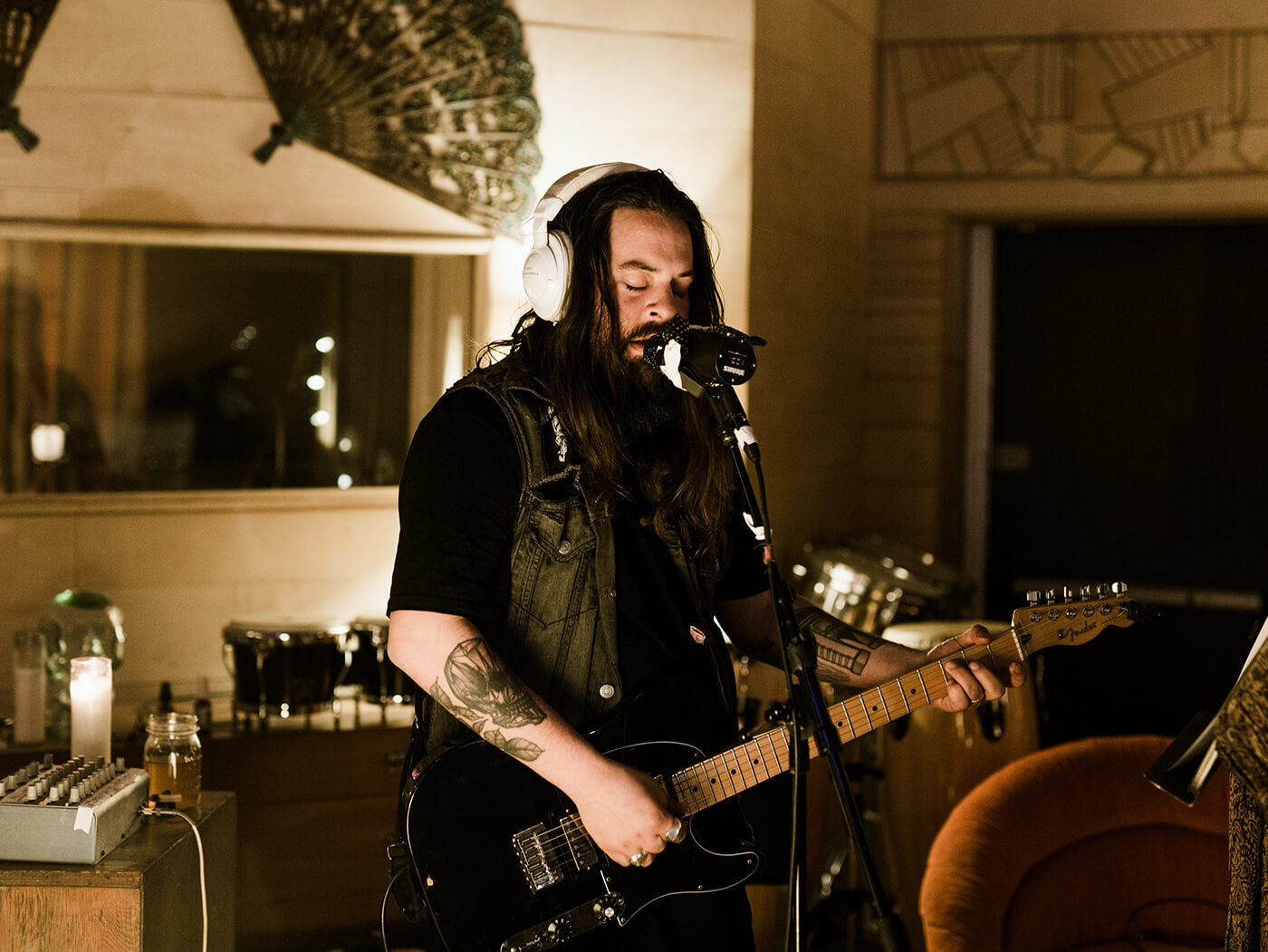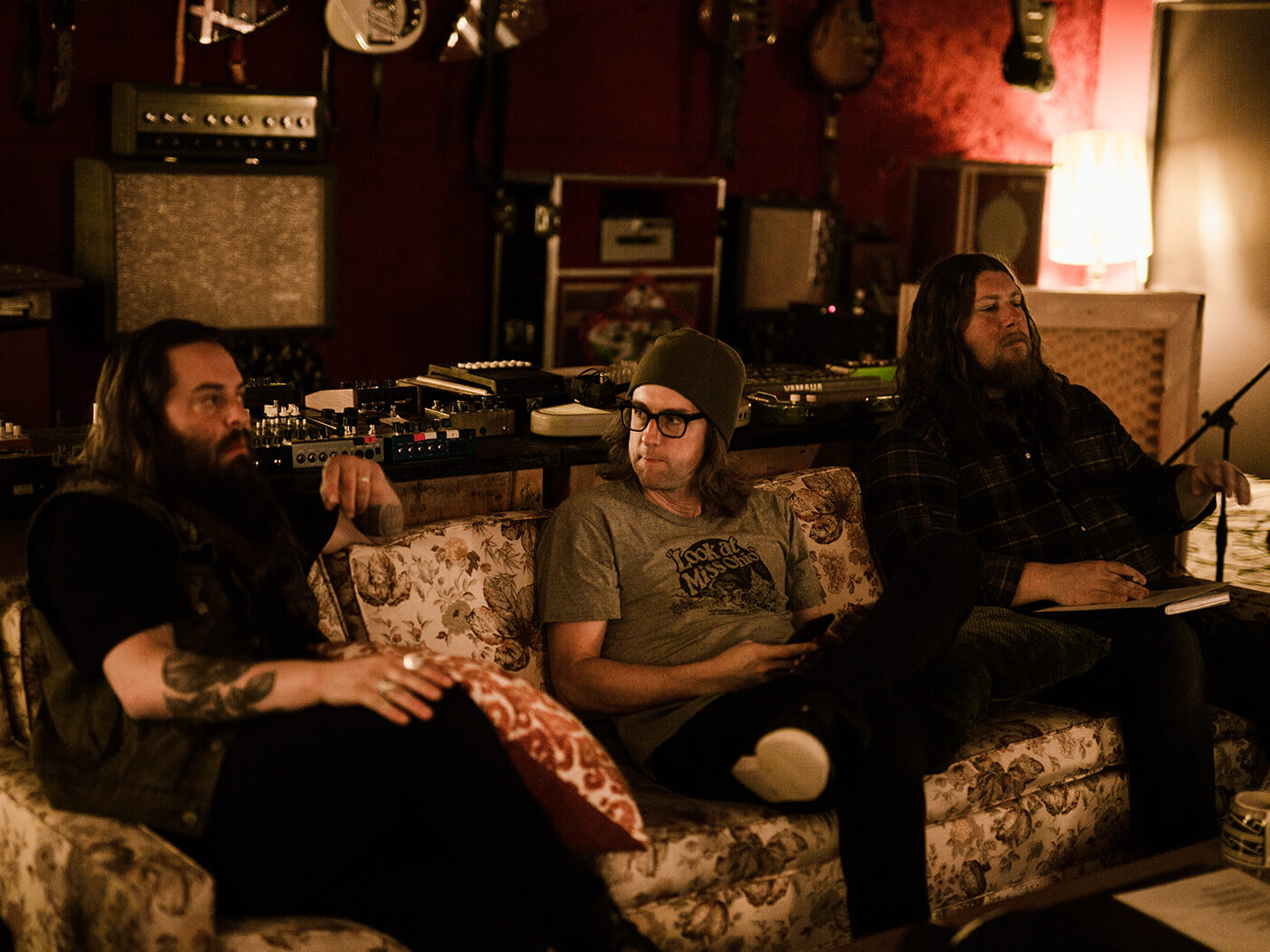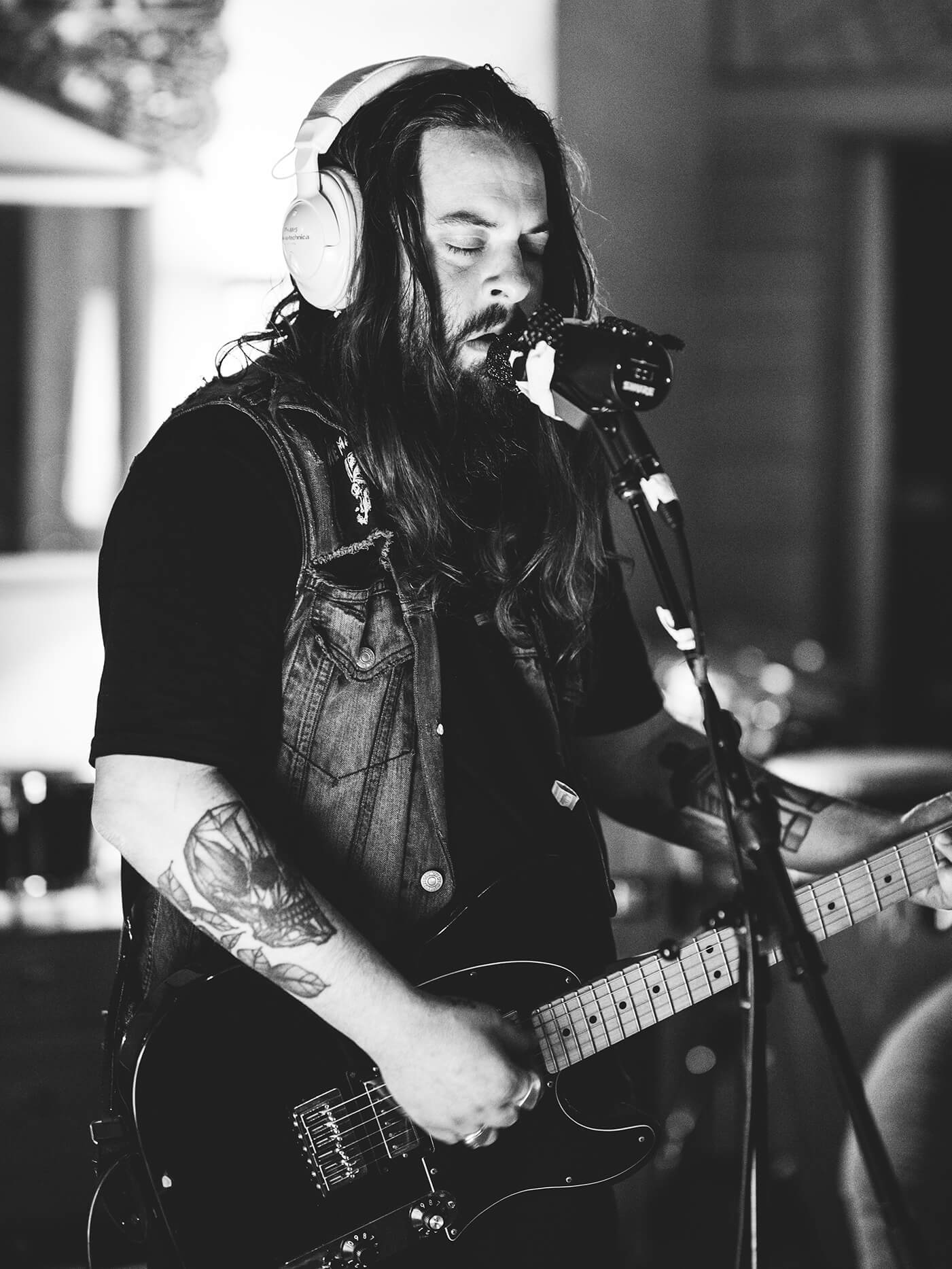Strand Of Oaks’ Timothy Showalter is back from the brink
Singer-songwriter Timothy Showalter talks about his one-man rock project Strand Of Oaks’ new album Eraserland, and how his friends helped him fall in love with making albums again.

All images: Crystal Ludwick
Timothy Showalter was done. Despite the acclaim that greeted Strand Of Oaks’ fifth album, Hard Love, the guitarist and songwriter found himself in a hole, and was on the verge of quitting music altogether. Then his friends in My Morning Jacket decided to pull him out, dragging him into the studio and providing an elite backing band to create his most impressive album yet, Eraserland.
“I didn’t really wanna do it anymore,” says Showalter, the artist also known as Strand Of Oaks. That’s quite an attention-grabbing admission, but in these clickbait-heavy times, he’s keen to emphasise that this isn’t just a good marketing line. “It’s not for dramatic press. I know that’s how this game works – put a fireworks show up so people wanna write about it. But when I was trying to explain the record to people, that’s the only way that I could. I think it was an identity crisis.”
Back in 2017, Tim was promoting and touring his new album, Hard Love, but despite the album being well received by both critics and fans, something wasn’t right. “I released Hard Love a year after I made it, and I was singing about someone who I wasn’t anymore,” he reflects. “I was pretty wild for a little while there. But over the course of that year making Hard Love and being home, I changed in a good way. I loved the record and playing those songs live, but I had this idea of, ‘What am I doing? I’ve been doing this for 10 years. Who am I?’”
The changes may have been positive, but it coincided with Tim finding himself stuck in a rut, and unable to write new material, which in turn brought up a host of other issues. “Most of my life, playing guitar and singing, and writing songs, was an escape route out of anxiety and life,” he admits candidly. “That was my safe place… and then I was like, ‘Shit…’ Because being a musician is most of my identity – if you were to speak to friends or family, they would say: ‘Oh, he was really depressed.’ Like clinically depressed! But I equated it to, ‘I’m just not feeling the tunes right now!’”
Such was Tim’s disconnect from music at this time, he barely registered his label’s decision to take the wealth of unused material from the Hard Love sessions to create a brand-new album, Harder Love, which came out in 2018. “I forget that Harder Love even came out!” he exclaims. “I had very little to do with that. There was some good stuff on there, and the label kind of approached me and said: ‘People should at least hear these songs…’ And I’m like, ‘That sounds good. I’m gonna hike in the woods for a while!’”
Jacket required
And then something quite remarkable happened. “I got a phone call from my manager saying: ‘Are you making a record with My Morning Jacket?’ And I went, ‘What are you talking about?!’” Tim remembers. “He said: ‘WelI, I just got a call from all of them and they say they have studio time booked…’ and I didn’t have any songs written!”

Renowned indie-rock bands don’t just go around booking studio time with songwriters on a whim, and what was actually happening was something of a rock ’n’ roll intervention…
“They’re friends of mine, and the producer Kevin [Ratterman] is also a dear friend, and to their endless credit they caught wind that I wasn’t in a good spot, and they dropped everything,” he reflects wistfully. “For Chrissakes, Bo [Koster] the keyboard player… he’s Roger Waters’ keyboard player! And he had two weeks off in the midst of the The Wall Tour, and he decided to spend those two weeks with me in a studio in Louisville. It’s the last place he should have been – he should have been on a fuckin’ beach or something!
“My epiphany truly started when all these people started to come to my aid, and my first inclination was, ‘I need to write good songs, ’cos I can’t give this band mediocre shit!’ So I began writing the opposite of how I usually write – unselfishly! It gave me enough room to get out of my own head, and because of that, it became a pure form of expression that I couldn’t have planned on. And the songs just came – I don’t know where from! I still need to learn chords for half of them. I don’t remember writing them. I hope I did!”
Working with a very short deadline was a new one for Tim – “Sometimes I’ve written songs where there’s like a three-year gap between writing a song and putting out a record,” he admits – and with just a few short weeks to write an album, he headed for the beach to write…
“I love beaches in the off-season,” Tim explains. “I don’t know why, it’s just romantic. It looks like death, but a beautiful death! And the songs just kinda varied depending on my mood from day to day, or even what the weather was like at the beach! Like if it was a rainy day, it would be more introspective, but if it was sunny, the major chords would come flying. It all happened so fast.”
Finding space
If the writing and demoing process was a breeze, when it came to recording, the reality of the shoes he was filling rendered things a lot less comfortable. “I had a panic attack the first day at the studio, because we recorded everything live in this huge room, and I was standing where [MMJ frontman] Jim James should be standing!” Tim recalls. “And if anyone knows Jim James, I can’t sing like him – 99 per cent of the planet that’s ever existed can’t sing like him. I’m like, ‘What am I doing here!? I shouldn’t be allowed in this party!’
“But that night, the guys went for dinner and I stayed at the studio because I wanted to get my guitar tone working. And while I was there on my own, I walked around the studio and I saw that they all had extensive notes that they’d written. That to me, was like this moment of like, ‘Oh, they are so involved with this.’ This is not like when a label sets you up with a bunch of studio musicians. These are friends and they’re invested. Yes, they’re extremely accomplished and you look up to them, but this is not the moment to be starstruck. This is the moment to collaborate.”

With that hurdle overcome, the chemistry between Tim and the rest of the band was immediate and the recording process was remarkably smooth.
“It’s a testament to what good musicians they are,” he enthuses. “We really set ourselves up for failure, because we’d never played together before! But outside of maybe a few overdubs, everything was live. Even if it was nine minutes long. That’s the performance.”
Operating with that one-take mindset really gave Showalter an appreciation for how good his new backing band was, and one member in particular. “Tommy [Blankenship], the bass player, is a perfect bass player.” he insists. “After five days, a few of us went out for dinner, and he went somewhere else, and we had this realisation… ‘Guys, Tommy hasn’t messed up yet…’ He never hit a wrong note! You’re supposed to do something wrong, to make everyone else feel better! It’s like, ‘Tommy, please, I messed up my own lyrics on that last track!’”
Strictly rhythm
When it came to the album’s guitar sounds, Tim found himself in the unusual position of not being the primary lead guitarist, with MMJ’s Carl Broemel filling that chair. “Usually, I have a ‘space station’ pedalboard and everything. But my stuff was really simple, it was strictly for rhythm,” Tim recalls. “I was mostly playing a Frankenstein Telecaster – that for some reason I put mini-humbuckers on – through what looked like a Magnatone, but it’s got a single 12 in it – I don’t know if one of Kevin’s friends made it or what.”
Taking a back seat on the lead guitar side did give Showalter a chance to appreciate the creativity and uniqueness of Broemel’s playing, however…
“He has a Duesenberg that’s like a tour de force of tone,” Tim enthuses. “But his secret is that he would be sitting down in front of this pedalboard, and he had an Echoplex. And as he was soloing on stuff like Weird Ways or Forever Chords, his right hand was constantly working that as he was playing.”
Showalter has developed a reputation as a fan of extended jams, exploratory solos and a general tendency to wig out whenever possible, but by not really playing solos on the album, he began to look at things from a different perspective.
“The thing I love about Eraserland is that there’s very little jamming,” he admits. “It’s extremely structured, and I think that to me always felt unappealing in the past. But when you think about The Dark Side Of The Moon, in your memory, it’s almost as if Gilmour is soloing the whole time. Like an epic jam. But then when you go back and listen to it, it’s actually so composed and orchestrated.
“In my past records, like Hard Love, I was just like, ‘Let’s just jam, fuck it all, start the track!’ And that was fun and all, but for something like Forever Chords, we had it down to a measure. Technically, there are only like three solos on this album.”
Isbell of the ball
One of those three solos was reserved for a very special guest – Jason Isbell. The guitarist is another friend who wanted to help Tim get back in the saddle, and leant his considerable skills to the track Moon Landing.
“Jason and I go way back,” Tim explains. “I played shows with him maybe 10 years ago? We’ve remained friends and played off and on together since, and he’s a wonderful person. He has such a beautiful voice and writes award-winning songs, and we sent him the most crazy and dissonant song on the record.
“He really wanted to be on it, but was touring so he couldn’t come to Louisville, so we sent him the track after we were done with it, and we were like, ‘Well, what’s he gonna do with this?’ And then he came back with like a Hendrix-level Machine Gun solo! And I think that I’m most proud of that – because you see it with him live, but I want more people to know that he’s one of the most inventive players around.
“My god, if you listen to the raw track of Moon Landing and his solo, there’s things in there that sound like he’s eating his guitar or something! How is he doing that?! And it was bone dry – no delay or reverb, or anything, just deadly tone. Love that.”

Land of plenty
After coming so close to jacking it all in before Eraserland reignited his creativity and love of music, we can’t help but conclude our chat by asking Tim how he’s feeling about the whole thing now…
“I wanna make more records,” he affirms. “But I have to put this album to rest as a piece of art in order to open my brain up to make the new. I always tell friends that the two weeks after I get the master, I have this golden moment where I listen to my own record, and I listen to it, and I like it… and then it’s done forever. I’ve given it to the people.
“It feels good to know that maybe in six months, I’ll be able to maybe start the next one, but I just need to have that moment to let go. It took me a long time to let go of Hard Love, but that enabled me to do this, which was such a positive experience. Hopefully, I won’t have to go through that again this time, though… these dramatic stories, I’m just tired of them!”
Eraserland is out now on Dead Oceans.
